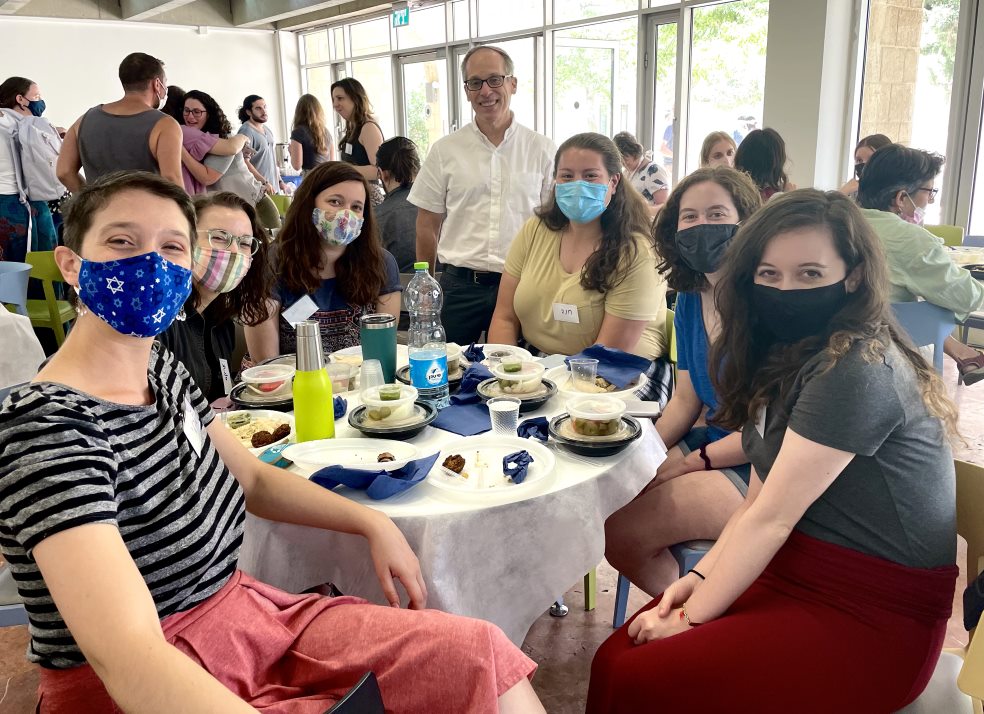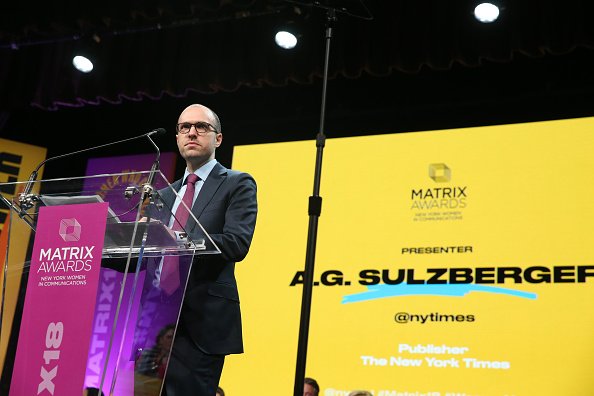Your Daily Phil: UJA-Fed. of NY mandates vaccines + Expanding summer camp mental health staff
Good Thursday morning!
UJA-Federation of New York, the country’s largest federation, is monitoring public health conditions that might necessitate revisiting its plan to require employees to return to the office on Sept. 13, the federation’s CEO, Eric Goldstein, told eJewishPhilanthropy. The federation had set a schedule of in-person work on Mondays, Tuesdays and Thursdays, with Wednesdays and Fridays as remote days.
The federation is also mandating vaccinations except for those with medical and religious exemptions, and 92% of the staff is already vaccinated, Goldstein said. Some employees have received medical advice to refrain from vaccinating due to problems such as compromised immune systems, he said. He is not yet aware of anyone who has asked for an exemption on religious grounds.
“That would be pretty exceptional,” said Goldstein, an attorney who previously worked as a partner at the law firm Paul, Weiss. “I’m not an expert on this and I haven’t needed to weigh in yet on that. Every organization, for-profit and nonprofit, is wrestling with these issues.”
The Jewish Federation of Greater Los Angeles is also requiring employees to vaccinate. In the last two weeks, a surge of big employers including Tyson Foods and Google have mandated vaccination for in-person staff as a condition of employment due to a spike in the national COVID-19 infection rate, according to The New York Times.
EMOTIONAL BAGGAGE
Expanded mental health staff worked to help campers struggling after a lonely year


Habonim Dror Camp Tavor
Campers this year are suffering from more homesickness than usual and are struggling to adjust to communal living due to the pandemic, Jill Goldstein Smith, a senior program manager at the Foundation for Jewish Camp, told eJewishPhilanthropy’s Helen Chernikoff. “The pandemic exacerbated existing mental health needs,” Goldstein Smith said.
Dear Soul: The Marcus Foundation had made a $3 million grant in 2019 to build on FJC’s existing mental health efforts, funded by Neshamot, a women’s philanthropy, in 2017. That program, which Goldstein Smith called FJC’s “first big foray around mental health,” focused on providing training for camp professionals in the New York area. The Marcus Foundation grant funds FJC’s “Yedid Nefesh,” or “Dear Soul,” initiative, which this summer has created an expanded mental health infrastructure administered by the Foundation for Jewish Camp (FJC).
Online offerings: Yedid Nefesh provides a subsidy to hire and expand the role of mental health professionals in 31 camps for three years, Goldstein Smith said. Six of the camps are day camps and the rest are overnight camps. More than 90 camps applied, and applications for the second and final cohort, of about the same size, will open in the fall. In 2020 and 2021, more than 600 camp staff received online mental health training, such as a youth mental health first aid certification, funded by the program. Forty-five counselors participated in a virtual program that created mental health resources for the field of Jewish camp.
Ahead of the curve: Across the summer camping world, staff were working to expand their access to mental health professionals this summer, knowing there would be an increased need for their skills, said Tom Rosenberg, CEO of the American Camp Association (ACA), who came to that position after serving as executive director of Camp Young Judaea in Hendersonville, N.C. “Jewish camps got ahead of this,” Rosenberg added.
Read the full story here.
UNSETTLING TIMES
Assessing Jewish institutional behavior and practice in the age of COVID


Shutterstock
“Twelve years ago during the economic recession of 2008, we observed that the Jewish communal and religious sector underwent a significant economic and structural tsunami,” writes Dr. Steven Windmueller, emeritus professor of Jewish communal studies at HUC-JIR, in an opinion piece for eJewishPhilanthropy.
Fast forward: “Today, we are able to monitor the further downsizing of institutions, while anticipating the closure and merger of others. Major sectors of the Jewish communal economy are also being directly impacted in connection with the downsizing of national organizations and agencies, along with the reduction of personnel associated with schools, camps, synagogues and community centers.”
Pandemic generation: “The COVID-19 experience, along with the 2008 recession, is not only impacting institutional trends and personal behaviors but will fundamentally influence how an entire generation of millennials and Gen Z will define their life choices, values, and behaviors.”
Viability factor: “The ‘viability factor’ will determine which of our organizations will survive and those that may not. It would appear that along with the rest of our society, elements of our communal structure are likely to leave the scene or face major reductions in size. Cultural institutions, as an example, may not be able to manage in an economy that will focus primary resources on core human needs.”
Economic realities: “Institutions without alternative income streams, sufficient financial reserves, and a fiscal game plan for managing the future are also not likely to survive. A dominant theme within the Jewish marketplace, in the aftermath of this moment, will be identifying creative financial options as we move forward.”
CAMPUS VOICE
Israel education, not advocacy


Courtesy / eJP Archives
“How do you explain to someone that you are interested in Israel education, not advocacy. That you want to challenge Jewish students to really consider what Zionism, Israel, and Judaism means to them and Judaism instead of aimlessly defending a country with overly simplified soundbites,” writes Moshe Daniel Levine, the senior Jewish educator at OC Hillel, in an opinion piece for eJewishPhilanthropy.
Campus isn’t a battleground: “Is it even worth it to try and convince people that haven’t been on a university campus for 35 years that campus isn’t a battleground? That the vast majority of students have no strong opinions about Jews and Israel and that BDS passing in some meaningless college vote isn’t the biggest threat to the Jewish future.”
Real needs: “What the Jewish community writ large needs is an investment in Israel education, not Israel advocacy. I don’t want or need Jewish students to be able to regurgitate facts and statistics off a pro-Israel pamphlet only to be countered by an anti-Israelist reading the opposite facts and statistics off their own pamphlet.”
Worthy Reads
Time And Money: A new survey shows that 65% of workers whose jobs can be done remotely would sacrifice 5% of their pay for the ability to work from home permanently, reports Lisa Fleisher in Bloomberg. That statistic could reflect a straightforward financial calculus made by employees who would save more than that amount by not commuting, Fleisher acknowledges, but other survey findings show that the desire to avoid the office goes deeper than commuting costs. Nearly half of the workers surveyed said they would give up a quarter of their days off to work from home, and more than half said they’d give up Netflix, social media or Amazon. [Bloomberg]
Revolving Door: In Inside Philanthropy, Michael Kravate assemblesa list of more than two dozen Biden administration officials with past experience in philanthropy, including Secretary of Veterans Affairs Dennis McDonough and several other high-level advisors and appointees, many of whom had worked in the Obama administration. Most come from the country’s highest-profile foundations, such as the William and Flora Hewlett Foundation, although four hires have the lesser-known Markle Foundation on their resume. “While the early 20th century White House was a powerbroker being courted by an admiring philanthropist eager to fund a project in the nation’s service, the White House today is doing the admiring and the chasing of private philanthropy,” said Maribel Morey, a historian. [InsidePhilanthropy]
Financial Priorities: A new survey shows that Americans from ages 18 to 30 are giving more weight to salary than to mission in deciding whether to work for a nonprofit, writes Derrick Feldmann in Philanthropy News Digest. This phenomenon could create a labor shortage in the charitable sector, Feldmann suggests, citing the fact that a third of the survey’s respondents said low pay had already kept them from accepting a nonprofit job. “The top three actions taken to support a social issue included donating professional services,” Feldmann noted. “This could be a response to accepting employment outside the nonprofit industry: Where they can’t afford to work, they will give their talent.” [PND]
Community Comms
Make an Impact. Spertus Institute seeks a Director for its acclaimed Center for Jewish Leadership. Find out more
Apply! Want to join the team at Jewish Insider/eJewish Philanthropy? We’re looking for a top-notch philanthropy editor. Learn more here.
Be featured: Email us to inform the eJP readership of your upcoming event, job opening, or other communication.
Word on the Street
A report released today by the U.K.’s Community Security Trust indicates record levels of antisemitism the first six months of this year and a 491% surge in school-related cases… The Conrad N. Hilton Foundation announced CAMFED, the Campaign for Female Education, as the recipient of the 2021 Conrad N. Hilton Humanitarian Prize… Photographs by the Duchess of Cambridge will be among more than 50 evocative images of Holocaust survivors and their families to go on display at London’s Imperial War Museum this summer… In a pilot program, Moishe House is testing co-working spaces in Northern Virginia, Los Angeles, Chicago and Rome… DC Comics is introducing the first Jewish superhero in more than 40 years – she’s a teenage social activist with a dog named Leibowitz…
Pic of the Day


HUC-JIR
Students spending the year in Israel gather for an opening day lunch at the HUC-JIR Taube Family Campus in Jerusalem.
Birthdays


Rob Kim/Getty Images
Publisher of The New York Times, Arthur Gregg “A.G.” Sulzberger…
Former member of the New York State Senate for 34 years, now of counsel at Ruskin Moscou Faltischek, Manfred Ohrenstein… Chairman of Delphi Capital Management, Robert Rosenkranz… Author Jon Winokur… Historian, Nazi hunter and director of the Simon Wiesenthal Center in Jerusalem, Efraim Zuroff… Once known as “Austria’s woman on Wall Street” and founder of Bank Medici in 1994, Sonja Kohn… Former Soviet Refusenik, he served as Speaker of the Knesset for seven years, Yuli-Yoel Edelstein… Intellectual property and entertainment attorney based in Ithaca, New York, Howard Leib… Member of the British House of Lords, Baron Jonathan Andrew Kestenbaum… Songwriter, columnist and noted baseball memorabilia collector, Seth Swirsky… Chair of the Department of Jewish History at Baltimore’s Beth Tfiloh Dahan High School, Neil Rubin Ph.D…. Actor who starred in “Weekend at Bernie’s,” Jonathan Elihu Silverman… President at ConservAmerica, Jeffrey Kupfer… Former member of the Knesset for the Kulanu party, Roy Folkman… Director of the Center for Middle East Policy at The Brookings Institution, Natan Sachs… Investment and foundation manager at Denver-based Race Street Management and a board member of Jewish Funders Network, Cintra Pollack… Lobbyist for the Wireless Infrastructure Association and an adjunct professor at American University, Matt Mandel… Comedian, writer, actor and member of the comedy duo Jake and Amir, Jacob Penn Cooper Hurwitz… Long-time member of the Israeli national soccer team who also played in Europe’s UEFA Champions League, Gil Vermouth… Baseball pitcher for Team Israel at the 2017 World Baseball Classic, Tyler Daschier Herron… Senior strategic designer at BCG Digital Ventures, Lila Cohn… Front-end web developer at Platform.sh, Abby Milberg… J.D. candidate in the 2023 class at Harvard Law School, Michael E. Snow… State affairs manager at Coalition to Stop Gun Violence, Lisa Geller…
Email Editor@eJewishPhilanthropy.com to have your birthday included.








